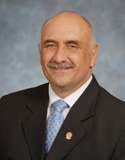If Gun Owners Can Be Licensed, Why Not Journalists?
A South Carolina legislator's stunt bill tweaks the press for failing to take the Second Amendment seriously.

Yesterday a South Carolina legislator tweaked anti-gun news outlets by proposing a bill that would require journalists operating in that state to register and be approved by the government. The scheme is, of course, blatantly unconstitutional, which is the point.
Michael Pitts, a Republican who represents Greenwood and Laurens counties in the state House, told the Charleston Post and Courier his South Carolina Responsible Journalism Registry Law, which is modeled after the state law requiring a permit to carry a concealed weapon, is aimed at stimulating discussion about the constitutionality of gun controls widely supported by members of the press. "It strikes me as ironic that the first question is constitutionality from a press that has no problem demonizing firearms," Pitts said. "With this statement I'm talking primarily about printed press and TV. The TV stations, the six o'clock news and the printed press [have] no qualms demonizing gun owners and gun ownership."
Although a Washington Post story about Pitts' bill links to the Post and Courier article, reporter Callum Borchers somehow missed the Second Amendment angle in his headlong rush to condemn Pitts' disrespect for the First:
My visceral reaction isn't printable but can be summarized thusly: This is a naked attack on the First Amendment—you know, the one that says "Congress shall make no law … abridging the freedom of speech or of the press." I realize we're talking about a state legislature here, not Congress, but we're also talking about one of the nation's founding principles.
That aside, this kind of law would be completely unworkable. Look, there's plenty of media garbage out there, but everyone has a different definition of what garbage is. Does anyone want a bunch of self-interested government officials setting the standard?
We register surgeons and pilots and teachers and people in many, many other professions. You can make a coherent case that journalism is a very important profession too, but there's a reason why journalists have reputations, instead of licenses. They have a fundamental American right to share information, and their audiences have a right to decide whether to believe it or dismiss it. By contrast, no one is entitled to remove brain tumors, fly airplanes or teach third-graders.
There's also a practical problem: How on Earth would South Carolina's secretary of state, charged with maintaining the registry, do its job here, anyway? Journalists can't even define who is a journalist anymore, what with all the bloggers and tweeters posting the kind of information and opinion that used to come only from a highly institutionalized press. Good luck to Pitts when it comes to crafting a legal definition of journalism.
Come to think of it, that's really the great folly here. What Pitts is proposing isn't just wrong; it simply can't be done. There's no stopping people from spreading the news in a digital society—certainly not with some outdated idea for a registry.
Borchers is so intent on refuting Pitts' tongue-in-cheek argument for regulating the press that he completely overlooks the legislator's implicit argument against regulating guns. If requiring people to obtain a license before they exercise their First Amendment rights is so obviously unconstitutional, Pitts wants to know, why is requiring people to obtain a license before they exercise their Second Amendment rights OK? The analogy casts doubt on the constitutionality of any law requiring government permission to purchase, keep, or bear arms. There are various possible responses to Pitts' question, but the fact that Borchers does not even notice it reinforces the legislator's point about journalists' refusal to take the Second Amendment seriously.
[Thanks to CharlesWT for the tip.]


Show Comments (150)